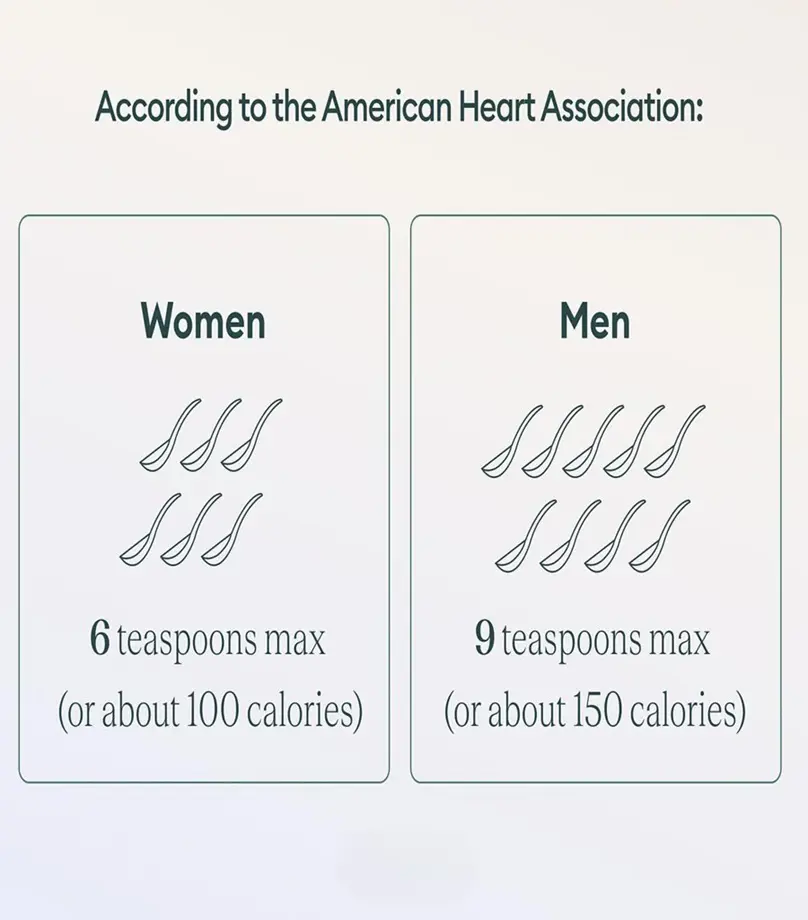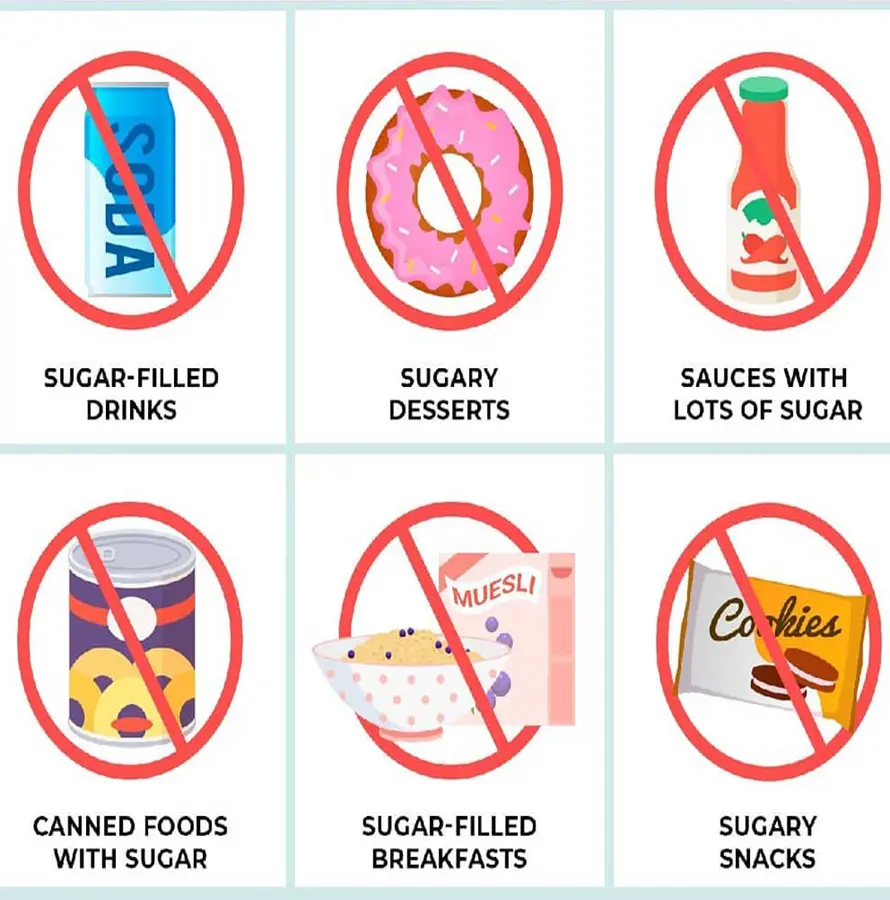What Happens When You Stop Eating Sugar

This post may contain affiliate links. If you make a purchase through links on our site, we may earn a commission.
Sugar is one of the most widely consumed substances worldwide and, not to forget, in excess. The average intake of sugar in the USA exceeds the recommended amounts and that's what has contributed to the health havoc in the majority of the population.
These ill effects are what brings us to sugar detox, which helps us stop consuming excess sugar. Anyone who is on this journey can experience different changes in the short and long term, which range from nausea and weakness to a healthy body. Let's discover how cutting sugar out can be challenging yet ultimately beneficial for overall health.
Impact of Sugar In Our Body
It's important to understand what sugar is and how it affects the body before understanding the effects of stopping sugar consumption. Sugar is a carbohydrate present naturally in almost all foods we consume daily.
If we talk about the forms, glucose and fructose are commonly present sugars in different foods. These forms help to fuel up our body cells, hence, keeping our body fully functional.
The sugar levels in our body are regulated by the insulin hormone which prevents any unnecessary spikes in the blood. Overall, a healthy level of sugar level is essential in our body and mindful intake causes no harm to us.
Natural Vs Added Sugars

The whole foods we obtain from nature are composed of sugars and many other nutrients. The natural sugar present in these foods is the best sugar option one can have to achieve a healthy body.
If we look at a particular nutrient fiber present in whole foods, it slows down the digestion and absorption of these sugars, as a result of which the release of sugar in the bloodstream slows down. This slow and steady release is important to maintain balanced blood sugar levels and to keep everything on track.
Added sugars, as per the name, are sugars introduced to food during processing or preparation. They can be present in any food that is manufactured industrially, including breakfast cereals and corn syrups. Now, talking about the digestion and absorption of added sugars, on the contrary side, they are randomly absorbed in the blood.
This means there is no control over the blood sugar spikes and the quick fluctuation can lead to even more sugar cravings. Except for the added sugar content, the nutrients that get stripped off during processing further degrades the nutritional value of these sugars.
Recommended Intake Of Sugar

The Reference Intake (RI) for total sugar is 90 grams per day, a value that combines both natural and added sugars found in food.
This value does not target the limitation in whole foods though, as the sugars present in them have no significant concerns on health. This is mainly due to the reason that these sugars don't heavily impact blood sugar levels. The American Heart Association (AHA) guideline has put a limit on the amount of added sugar that is actually needed per day. Let's have a look:
- Women: No more than six teaspoons (25 grams)
- Men: The recommended limit is 9 teaspoons (38 grams)
- Children: Between 3 to 6 teaspoons (12 to 25 grams)
This value from AHA resembles that provided by the World Health Organization (WHO) which suggests about 25g of sugars in a diet of 2,000 calories (5%).
Sugar Detox

A sugar detox is a period in which people reduce the intake of added sugars, generally to improve health. The time period may vary depending on the goals and during this whole time, you avoid all the processed sugary foods you have been consuming.
Processed foods are replaced with whole foods to cut out the cravings you might have to face during the journey. And for people who find it difficult to completely abstain from what they are used to, other strategies like getting off from one food source at a time are recommended.
Though many symptoms might appear during the initial days, the body can adjust accordingly in the long run. As these symptoms subside after a few days, your health starts to improve and by eliminating excess sugar, you can set the foundation for long-term well-being. A sugar detox hence encourages healthier eating habits and better control over cravings.
Effects Of Sugar Detox

Sugar has been an important part of our day-to-day life, so abstaining from it completely will surely create some panic in the body for a shorter time. But in the long run, once the body adapts to this situation, there are a lot of benefits that come to you. Let's have look at both:
Immediate Effects
Sugar is an important part of the brain's reward system, whenever we consume it, our happy hormones like dopamine like dopamine get released. So, cutting it out during a sugar detox can lead to several immediate mental effects as the body adjusts. Here are important mental impacts people may experience:
- When the feel-good chemical in the brain, dopamine, is released in less amount, you might go through feelings of irritability or sadness during a detox.
- The lack of sugar also affects blood sugar levels, so, feelings of anxiety or nervousness are also common. This is partly due to the body's dependence on sugar for quick energy and emotional regulation.
- As the body adjusts to lower sugar intake, some people may struggle with sleep. They might find it harder to fall asleep or stay asleep, as less sugar also affects the release of hormones associated with sleep.
- When your body goes through less sugar condition, you will definitely observe a lack of concentration and focus. This is quite obvious because glucose is the primary source of energy for the brain.
- Having an increased desire for sugar as well as other carbohydrate-rich foods is common during the initial sugar detox phase. This can make the whole journey even more tough and challenging.
Along with the above-listed mental effects, cutting out sugar during a detox also comes with several physical effects as your body has to face a crisis of sudden energy boost provided by sugars.
Feeling fatigued, experiencing light-headedness or dizziness and getting nauseous is quite common as the body detoxifies from the sugar it has been relying on.
Long Term Benefits

On a normal day, we consume a very high level of sugar and to get rid of the effects that normally occur due to high sugars, sugar detox is important. In the long run, sugar detox will help you have less addiction to sugar-laden foods and healthwise, you will see an improvement in different aspects as listed below:
Helps Maintain Blood Sugar Level
A long-term sugar detox mostly benefits the blood sugar level, making you less prone to conditions like diabetes. As excess sugar in the blood is related to a decrease in the functioning capability of the hormone insulin, related to diabetes, cutting off sugar helps you stay away from such chronic conditions.
Controlled Body Weight
Gaining weight due to excess sugar intake is not a new thing that we have heard of. So, going through a sugar detox can help you control your weight.
The sugars from processed foods make them calorie-dense foods and have proven to be an obstacle to maintaining a healthy weight. So, denying added sugars in your diet means you reduce calorie intake and also reduce cravings hugely. The excess sugar is also stored in the body in the form of fats. Overall, sugar detox can be a boon in long-term weight management.
Improved Mental Health
The mood swings, irritability, and energy crashes that come with high sugar intake can be kept at bay with controlled sugar intake in sugar detox. As the mood won't rely on the added sugars you consume, you will have a steady, calm and mind. These effects can also keep you away from any symptoms of anxiety and depression.
Heart Health
The effects linked to high sugar intake, including increased blood pressure, inflammation, and higher levels of harmful triglycerides are reduced when you are on a sugar detox journey. As a result, you will have healthier cholesterol levels and improved arterial function, reducing the chances of occurrence of heart problems.
Oral Health
The added sugar we consume is what is related to tooth decay and cavities. So, reducing sugar consumption is directly linked to the reduced chances of these conditions. Whenever we are in a sugar detox, the harmful bacteria won't get the source to survive on, lowering the risk of cavities, gum disease, and bad breath, overall, you will have healthier teeth and gums.
Skin Health
People who consume high amounts of sugar tend to develop signs of aging earlier. This is a proven fact, hence, adopting a sugar detox journey might help you achieve healthier skin. The amount of collagen and elastin in the skin is known to significantly reduce, in the presence of excess added sugars, which are primary components in maintaining the elasticity of the skin.
Liver Health
A diet high in sugar can eventually cause fatty liver disease. When we consume sugar in large quantities, which the liver has to metabolize, it stores all the excess in the form of fat. Over time, this can cause inflammation and liver damage. In a sugar detox, the liver gets a chance to detoxify, keeping the liver safe.
Other Alternatives

If you have already tried sugar detox and weren't able to keep up with it or if you think this isn't for you, there are other alternatives you can rely on to reduce sugar consumption. Have a look at the important strategies below:
-
Mindful Eating
Most of the time, eating without being mindful creates trouble. You need to know that you are eating to survive and should pay attention to your body’s hunger and fullness signals. When you eat while you're truly hungry not out of boredom or emotional triggers, the problem related to high sugar intake will be easily solved.
-
Stress Management
When we are stressed, the emotional eating button gets turned on, and due to unmanaged emotions, we tend to consume sugar-filled foods. So, pausing for a while and managing stress would do a lot of help to reduce the urge to turn to sugar for comfort.
-
Eat Fulfilling Whole Meals
Getting rid of sugars doesn't mean avoiding meals. Instead, when you are on a sugar deficit, you are likely to get more hungry. So, to reduce the chances of getting back to sugary snacking, it's important to have three to four meals a day, which keeps you fuller throughout the day.
While planning, focus on meals with fiber and fats to keep you full. This way, your brain won't produce any hunger signals, keeping you more motivated to consume sugar the whole day.
-
Healthier Snack
There are many healthy snack options you can choose from to get away from your sugar cravings. Have a bowl of berries or diced mangoes, these alternatives are what will make you forget sugary processed snacks.
The healthier options with natural sugars, which come in varieties more than you can imagine, can help you sustain your goals.
-
Be Kind To Yourself
Reducing sugar intake is not possible overnight, it is a process that takes both patience and time. So, during the whole time, you need to be kind to yourself.
During the whole process, if you slip up, don't get discouraged, instead of focusing on failure, refocus on your goal, make changes as needed and try again. The small, consistent changes are necessary to have a significant impact on your long-term health.
Tips On Sugar Detox

A sugar detox can be a hard-core challenge for some individuals. Here are some tips to help such individuals successfully complete a sugar detox:
- Start Slow: Sugar detox needs to be done in a slow manner to minimize withdrawal symptoms like headaches or irritability. If you consume processed foods heavily, try to reduce sugar intake by cutting out one food source at a time. For example, cut sugary drinks first followed by snacks, sauces/ jams and bakeries.
- Read Labels: There might be hidden sugars in processed foods, so, check food labels before consuming them.
- Replace with Whole Foods: Any food that comes naturally can be eaten during a sugar detox.
- Increase fibers and fats: To reduce sharp cravings, go for fiber-rich foods as they are certain to keep you full for a longer time. Also, replace your breakfast processed cereals with fats to maintain satiety throughout the day.
- Stay Hydrated: Plenty of water is important to flush out all the toxins as sugar detox is linked with heavy detoxification.
- Eat Regularly: You are more prone to hunger-driven sugar cravings during a sugar detox. So, try to have balanced meals every 3-4 hours to supply the body with healthy sugar levels.
- Avoid Artificial Sweeteners: You might think artificial sweeteners as a good replacement for your sugar detox, but, studies don't validate this.
Instead, artificial sweeteners can increase the temptation for foods containing added sugars. - Plan Based On Your Body: Not everyone's body is the same. So, depending on how your body responds to sugar detox, you need to create a balance. It would be best for you to plan the meals ahead so you can prevent unnecessary cravings and expectations.
Also, try to stay busy so you can easily adjust to the planned diet, moreover, exercise and adequate sleep are also of utmost importance. During the process, it takes you to be patient, so without rushing anything and keeping in mind that withdrawal symptoms are temporary, and the long-term benefits are worth it, go ahead!
Recent posts
Lifestyle
Lifestyle
How Much Caffeine Is in Green Tea
Green tea, a tea popular for its health benefits, comes with a gentle caffeine boost. Due to this low caffeine level, the drink can be considered perfect for those who want to stay alert without the jitters. The availability of caffeine in green tea ...
Lifestyle
The Benefits Of Avocado Seeds You Must Know About
After devouring the avocado, we have the habit of dumping the seed without giving it a second thought. However, this part of the fruit is just as essential as the avocado because it delivers numerous nutrients and potential health benefits that might...
Lifestyle
How Much Caffeine Is Too Much In One Day?
Without even realizing it, caffeine is stapling in our everyday lives. Our mornings usually begin with a cup of coffee, likewise, to get through the afternoon slump we might sip on an energizing drink or grab a refreshing soda on a sunny day to quell...
Lifestyle
How Much Water Should You Drink Per Day
Water makes up 60% of our total body weight, making it an essential component to maintain our health. As it is present in all cells and organs of the body, proper water intake means every function in the body is running well. There are multiple benef...
Lifestyle
How To Eat Cactus Fruit Prickly Pear And What Does It Taste Like
Prickly pear, the unspoken hidden treasure in the list of fruits, is scientifically known as Opuntia ficus-indica and grows on the prickly pear cactus (Opuntia species). The appearance of this delight is very appealing and striking. By seeing its app...
Lifestyle
Is Soybean Oil Healthy? Good Vs. Bad
Soybean oil is a well-known cooking oil, preferred in kitchens around the world. This oil stands out in every corner of the world for its mild flavors and versatility, however, when it comes to its healthiness the topic becomes debatable mainly becau...





